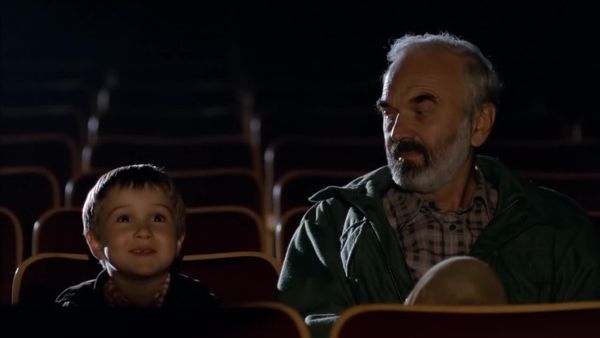Eye For Film >> Movies >> Kolya (1996) Film Review
Kolya
Reviewed by: Angus Wolfe Murray

The adjectival baggage dumped upon Il Postino relocated to Kolya. Words such as "heart-warming," "tender" and "deeply affecting" battled for the high ground with "emotionally honest," "compelling" and "a heart melter." For once international critics went soggy in unison. The movie won the Golden Globe and Oscar for Best Foreign Film, 1996.
It has a simple story and relies to some extent on whether seven-year-old Andrej Chalimon pulls it off. He plays five-year-old Kolya, temporarily abandoned by his mother, who ends up in the Prague loft of a 55-year-old bachelor. This man, Frantisek Louka, specialises in the cello and married women. He is proficient at both, but untrained in parenting.

At first, the prospect appals him, interfering, as it does, with his sex life and seriously undermining the freedom of movement he has grown accustomed to during the Communist occupation. And that's another thing. The boy doesn't speak a word of Czech. He is Russian. The whole episode is a nightmare, brought on by his own stupidity.
In a moment of weakness, he agreed to an arranged marriage to a Russian girl for enough money to clear his debts and buy a small car. When his "wife" disappeared after their unconsummated wedding night to join her lover in Germany, leaving her son, Kolya, with an aged aunt, who inconveniently dies, the hapless Louka becomes officially next of kin and, therefore, responsible for the snivelling child.
You can imagine what Hollywood would have made of this. Zsenek Sverak is from a different intellectual base. He wrote the script and plays Louka. His son Jan is the director. Together, they have transformed a potentially sentimental disaster area into a film worthy of those adjectives.
Andrej, by the way, pulls it off with such conviction any fears of emotional dishonesty are dispersed. Sverak Snr is so good at what he does, he leaves the majority of Californian scribes standing. Kolya deserves its accolades by accepting the challenge of a simple idea and turning it into a work of universal humanity.
Reviewed on: 11 Sep 2005
















